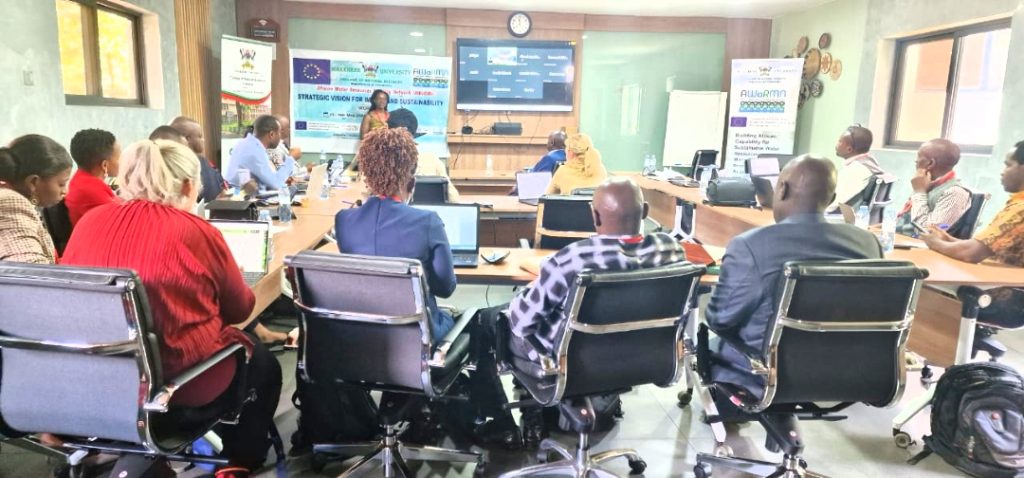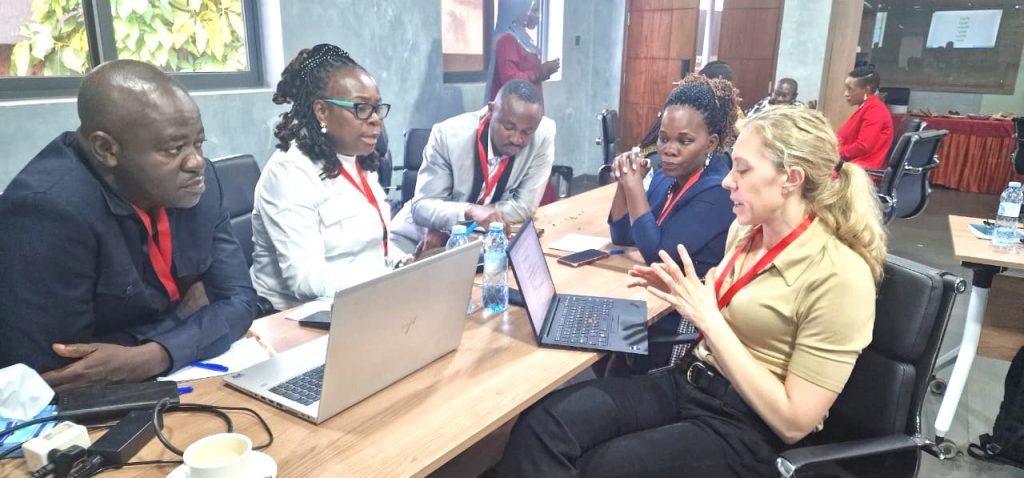AWaRMN partners during the workshop at Fairway Hotel in Kampala on 14th May 2024
Overview and successes registered by AWaRMN
The African Water Resources Mobility Network (AWaRMN), a multi-partner project of the EU funded Intra-Africa Academic Mobility Scheme has over the last four years of implementation registered great success. Initiated in 2019 and launched on 20th October 2021 at an event hosted by Rhodes University, South Africa, the lead partners, AWaRMN has to date, supported the training of 32 MSc students, 12 PhD students and 12 academic and administrative staff on exchange programmes. The project, currently in its fifth year of operation, is aimed at fostering collaboration and cooperation between higher education institutions in Africa in the water research sector through mobility. The project is a collaboration between five partner institutions on the continent: Rhodes University in South Africa, University of Kinshasa in the Democratic Republic of Congo, Federal University of Technology in Nigeria, Makerere University in Uganda, National School of Hydraulics in Algeria, and TU Delft in the Netherlands. The PI of the project is Prof. Nelson Odume from Rhodes University. At Makerere University, the project is coordinated by Prof. George Nyakairu from the Department of Chemistry.

According to the different partners, AWaRMN has been a great success. The project has built capacity to address complex water-related challenges. “The project has supported 55 mobilities. I’m happy to report that the project has supported students from 22 African countries, and the majority have taken up academic roles at their respective institutions and others have acquired scholarships to advance their studies. We extend our appreciation to the EU for identifying and funding this noble cause,” Prof. Odume. Additionally, the project has boosted internationalization efforts at the different institutions, with several now attracting more foreign students. It has also culminated into several publications on the management of water resources. The project has however experienced several challenges, especially in accessing visa for mobility across Africa. It has also been challenging to recruit female students given their peculiar responsibilities.

Transitioning to a more sustainable network
The project is now transitioning into a collaborative network aimed at sustaining research capabilities across stakeholders in the field of water resources in Africa through various avenues. One such avenue is through developing the AWaRMN Future Earth Hub Leadership Centre Science Cluster on Water funded by Future Earth Global and the South African National Research Foundation.
In a bid to plan for the future direction of the project and to facilitate its successful transition, representatives from partner institutions held a two-day meeting in Kampala from 15th-16th May 2024 to deliberate strategies for expanding the project into a big collaborative network aimed at fostering sustainability and causing impact in the communities.


Strategic vision for impact and sustainability
According the Project PI, Prof. Nelson Odume, the core strategy for AWARMN Impact and Sustainability will be addressed through a triangular dimension of capacity development, including individual, institutional and enabling environment.
- At the individual dimension, the sustainability strategy seeks to establish and sustain an African Continent Network of AWARMN Alumni (ACNAA), which will be made of AWARMN students and staff who benefited from the project capacity building activities. This is a community of practices for: i) Experience sharing and innovation in the African water sector under the context of climate change, ii) Identification of opportunities to bridge knowledge gaps and implement green solutions, including nature-based solutions for climate change resilient development.
- At the institutional dimension, the sustainability strategy seeks to actively engage with stakeholder institutions and organisations – government, civil society, philanthropy, founders, private sectors, industries, entrepreneurs – concerned with water resources management and climate change challenges in Africa, with the aim of establishing a strategic partnership. The advantage of such a partnership is two-fold: first, many of these institutions suffer from a critical lack of adequate skills to implement the required management strategies. They do require refresher courses or tailor-made capacity building programs to update their skills for solving day to day problems. In many cases, alternative solutions to these challenges are difficult given the lack of local opportunities. In this regard, the continental strategy for sustainability will address this challenge through a comprehensive Stakeholder Mapping and Capacity Building Needs Assessment, which will help co-produce and implement a custom-made capacity building programme for delivery by AWARMN across the region, and facilitate cross fertilisation through mutual learning and horizontal exchanges of knowledge and experience. Secondly, these institutions offer opportunities for internship and professional development of alumni. The sustainability strategy in this regard will establish MOUs with key stakeholder institutions to facilitate integration, establish a strategic partnership, create opportunities for mutual learning and horizontal exchanges of knowledge and experience, and co-create internship and professional development programs.

3. The third dimension of the triangular sustainability strategy is at the level of enabling environment, which seeks to produce and disseminate new knowledge to achieve transformation, paradigm shift and theories of change for policies development of cultural, socio-economic and environmental factors that underpin sustainable water resources management under climate change in Africa. Under this component, partner institutions will establish a value chain of knowledge management that enables co-production of new knowledge, mutual learning, cross fertilisation, skills development, innovative solutions and strategic dissemination through experts’ meetings and workshops, scientific conferences, publications of scientific papers, policy briefs and media papers. A Monitoring Evaluation and Learning approach will be adopted to implement a feedback loop necessary for update and improvement on the new ways of knowledge transfer to strengthen institutions and individual capacities, and enable a conducive environment for sustainable development.


At the two-day meeting held in Kampala to plan for the future, the partners identified a set of actions to implement going forward. “We have identified a set of priority research areas to pursue and funding opportunities to bid for going forward, and some of these plans are already yielding fruit, for example AWaRMN is hosting the Future Earth Hub Leadership Centre Science Cluster on Water and the purpose of the cluster is to strengthen African leadership in the field of water resources,” Prof. Odume. The partners also plan to start up a journal on African water resources.



